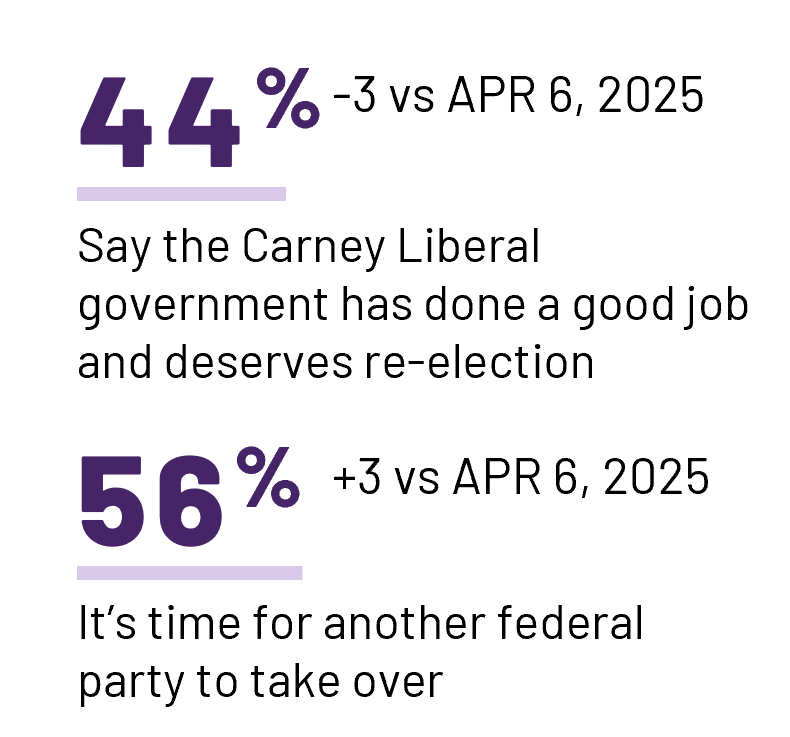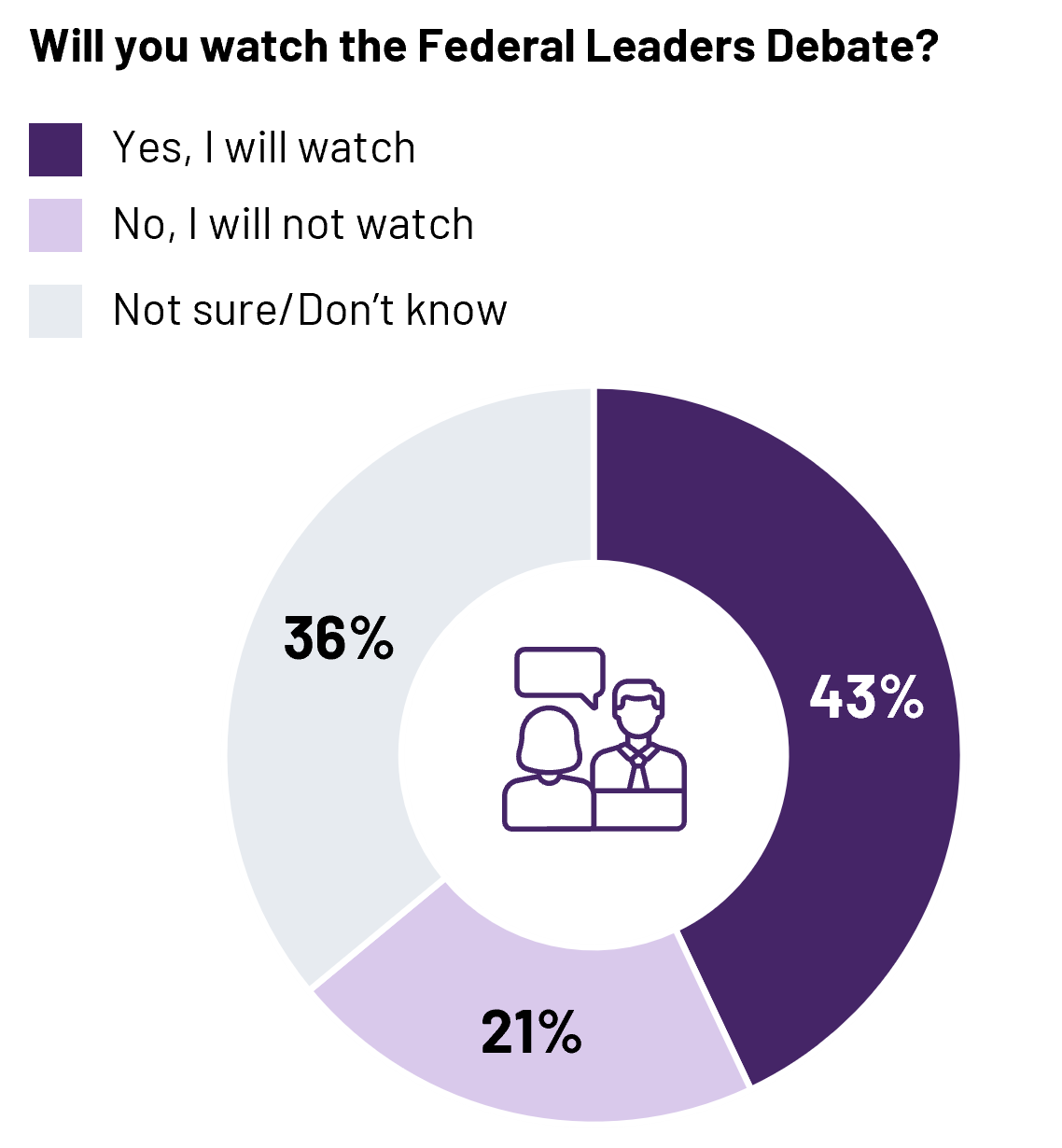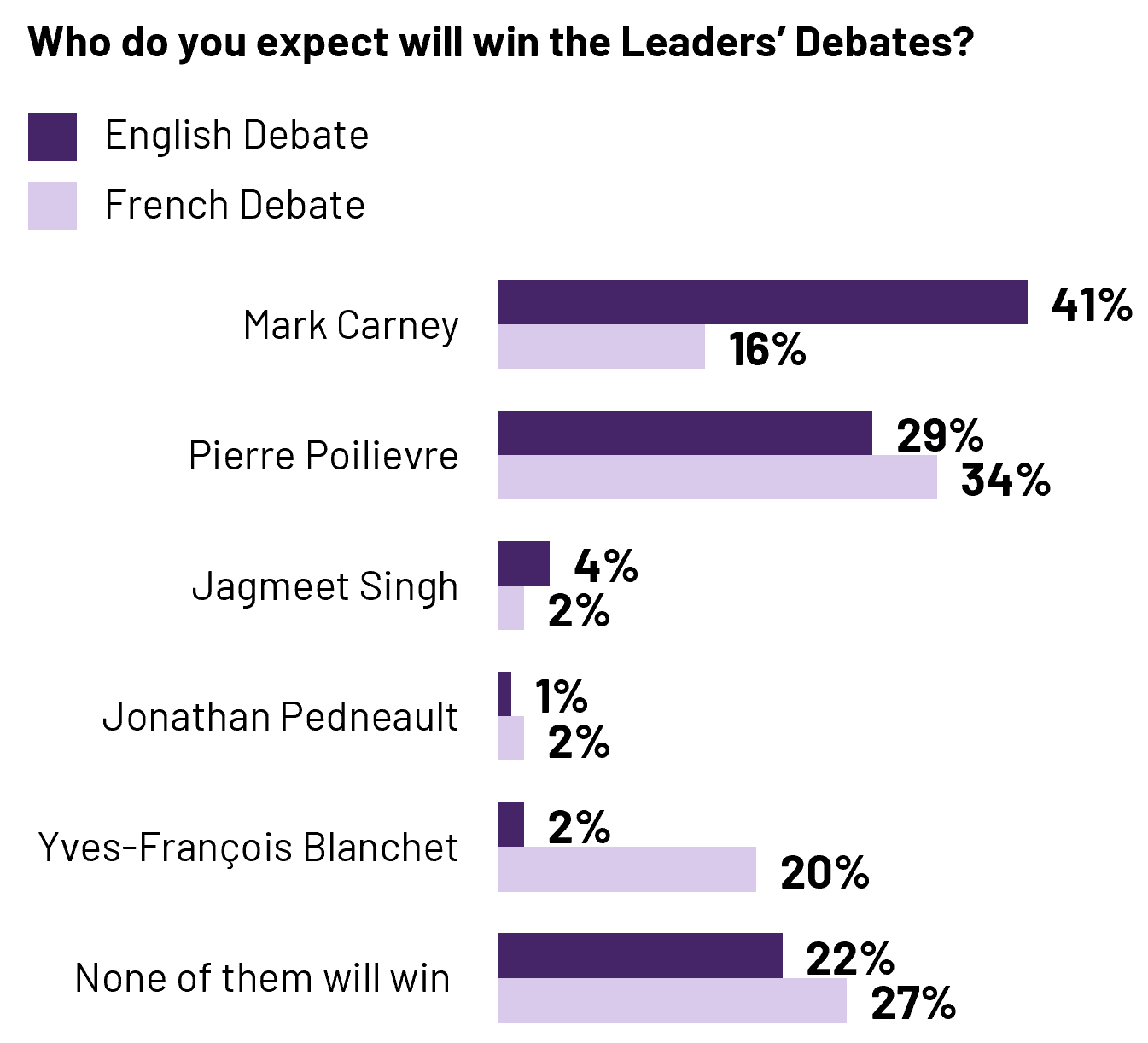Race Tightens as Campaign Moves Into Critical Debate Week

As we move into debate week, the Liberal party (42%, -4 pts vs. last week) has lost a bit of ground for the first time since the campaign began, and the Conservative party (36%, +2 pts) has narrowed the gap behind the Liberals. Around one in ten Canadians (11%, +1 pt) say that they would vote for the NDP if an election were held today, while 6% would vote for the Bloc Québécois, 2% (-1 pt) would vote for the Green Party, and 1% would vote for the People’s Party or another party, respectively. Eleven percent are undecided (+4 pts vs. last week).


After three weeks of campaigning, Canadians are most likely to say that their likelihood to vote Liberal has increased (33%) since the campaign began compared to other parties. One-quarter (25%) say they are now more likely to vote Conservative and 9% are more likely to vote NDP. Those age 55+ are more likely than other age groups to say they are more likely to vote Liberal (40%) and less likely to vote Conservative (41%).



Declining from last week, four in ten Canadians (41%, -4 pts), feel Mark Carney would make the best Prime Minister of Canada, while Pierre Poilievre has picked up the loss as 36% would select him for the job (+4 pts). Just over one in ten (12%) continue to select Jagmeet Singh, stable from last week.
Consistent with the declines in Carney’s momentum elsewhere, 44% say the Carney Liberal government has done a good job and deserves re-election on April 28th (-3 pts) while over half (56%, +3 pts) say it’s time for another federal party to take over in Ottawa. Just over half (52%, +4 pts vs. March 30th) say they approve of the Liberal government under Mark Carney.



Around four in ten (43%) Canadians expect to be tuning into the Federal Leaders debates held on April 16th and 17th, while 21% say they will not watch, and over one-third (36%) are not sure.
When it comes to who Canadians think will win each of the debates, Carney is the clear favourite for the English debate (41%) compared to 29% for Poilievre, and single-digits for the other party leaders. On the other hand, Poilievre (34%) leads Carney (16%) on projected winner of the French debate, with 20% feeling Bloc Québécois leader Yves-François Blanchet will win the French debate. Around one-quarter in each feel that none of the party leaders will win either the English or French debates.

These are some of the findings of an Ipsos poll conducted between April 8th and 10th, 2025, on behalf of Global News. For this survey, a sample of n=1,000 Canadians aged 18+ was interviewed online, via the Ipsos I-Say panel and non-panel sources, and respondents earn a nominal incentive for their participation. Quotas and weighting were employed to balance demographics to ensure that the sample's composition reflects that of the adult population according to Census data and to provide results intended to approximate the sample universe. The precision of Ipsos polls which include non-probability sampling is measured using a credibility interval. In this case, the poll is accurate to within ± 3.8 percentage points, 19 times out of 20, had all Canadians been polled. The credibility interval will be wider among subsets of the population. All sample surveys and polls may be subject to other sources of error, including, but not limited to coverage error, and measurement error. Ipsos abides by the disclosure standards established by the CRIC, found here: https://canadianresearchinsightscouncil.ca/standards/
For more information on this news release, please contact:
Darrell Bricker, PhD
CEO, Ipsos Global Public Affairs
+1 416 324 2001
[email protected]

Ipsos is one of the largest market research and polling companies globally, operating in 90 markets and employing nearly 20,000 people.
Our passionately curious research professionals, analysts and scientists have built unique multi-specialist capabilities that provide true understanding and powerful insights into the actions, opinions and motivations of citizens, consumers, patients, customers or employees. Our 75 business solutions are based on primary data from our surveys, social media monitoring, and qualitative or observational techniques.
“Game Changers” – our tagline – summarizes our ambition to help our 5,000 clients navigate with confidence our rapidly changing world.
Founded in France in 1975, Ipsos has been listed on the Euronext Paris since July 1, 1999. The company is part of the SBF 120, Mid-60 indices, STOXX Europe 600 and is eligible for the Deferred Settlement Service (SRD).
http://www.ipsos.com/




